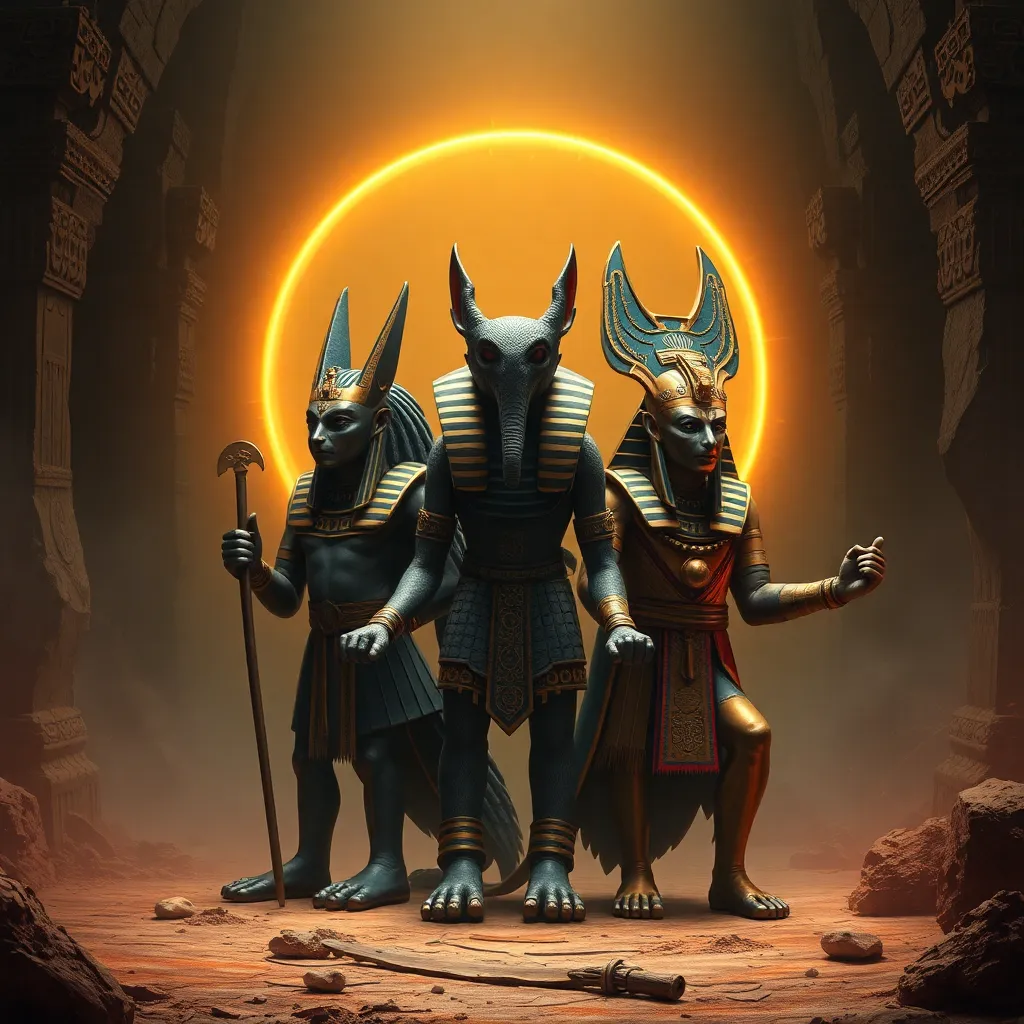The Guardians of the Underworld: Anubis, Thoth, and the Other Deities of the Dead and Their Roles in the Afterlife
I. Introduction
Ancient Egyptian beliefs about the afterlife were intricate and deeply woven into the fabric of their culture. They viewed death not as an end but as a transition to another realm where the soul would journey onward. This journey was fraught with challenges and required the guidance and protection of various deities who played pivotal roles in ensuring a successful passage to the afterlife.
The importance of deities in this process cannot be overstated; they were seen as essential guardians who maintained order and justice in the afterlife. This article explores the roles of key deities such as Anubis, Thoth, Osiris, and Ma’at, delving into their symbolism, responsibilities, and significance in the ancient Egyptian belief system.
II. Anubis: The Jackal-Headed God of Embalming
Anubis, often depicted with the head of a jackal, is one of the most recognized deities associated with death and the afterlife. His origins trace back to early Egyptian mythology, where he was revered as the god of mummification and the protector of graves.
Symbolically, Anubis embodies the qualities of vigilance and protection. His jackal form is thought to represent his role as a guardian of the dead, as jackals were often seen scavenging in cemeteries, which led to their association with death.
- Role in the mummification process: Anubis was directly involved in the embalming rituals, overseeing the preparation of the body for burial to ensure its safe passage into the afterlife.
- Guardian of the dead: He was responsible for guiding souls through the afterlife, ensuring they reached the Hall of Judgment without hindrance.
III. Thoth: The God of Wisdom and Writing
Thoth, depicted as a man with the head of an ibis or a baboon, is the god of wisdom, writing, and knowledge. His role in the afterlife is critical, as he is seen as the scribe of the gods, recording the outcomes of the judgment of souls.
Thoth’s attributes include:
- Wisdom: As the deity of wisdom, he represented the importance of knowledge and understanding in navigating the afterlife.
- Writing: Thoth’s association with writing highlights the significance of literacy in ancient Egyptian culture, especially in religious and funerary contexts.
During the judgment of souls, Thoth recorded the results of the weighing of the heart, where the deceased’s heart was measured against the feather of Ma’at to determine their worthiness for eternal life.
IV. Osiris: The Ruler of the Afterlife
Osiris, one of the most significant deities in Egyptian mythology, is often referred to as the ruler of the afterlife. His story is central to the themes of resurrection and eternal life. According to mythology, Osiris was killed by his brother Set and subsequently resurrected by his wife, Isis.
- Role as the judge of the dead: Osiris presided over the judgment of the deceased, determining their fate in the afterlife.
- Significance in eternal life: He represented hope for resurrection and rebirth, making him a symbol of life after death.
V. Ma’at: The Goddess of Truth and Order
Ma’at personified truth, balance, and cosmic order in ancient Egyptian belief. She was depicted as a woman with an ostrich feather on her head, which played a crucial role in the judgment process.
- Principles and symbolism: Ma’at’s principles were foundational to Egyptian society, promoting justice and harmony.
- Judgment process: During the weighing of the heart, the deceased’s heart was placed on one side of a scale, while Ma’at’s feather was placed on the other. If the heart was lighter than the feather, the individual was deemed worthy of entering the afterlife.
The importance of harmony and balance in the afterlife reflects the values that Egyptians held dear, underscoring their belief in justice and moral integrity.
VI. Other Key Deities of the Underworld
In addition to Anubis, Thoth, Osiris, and Ma’at, several other deities played significant roles in the underworld:
- Set: The god of chaos and storms, Set had a complex relationship with the afterlife, often seen as a force of disorder that challenged the established order.
- Isis: Known as the protector and guide of souls, Isis played a crucial role in assisting the deceased in their journey to the afterlife.
- Nephthys: The goddess of mourning, Nephthys was associated with funerary rites and the care of the dead, offering solace to grieving souls.
VII. The Afterlife Journey: From Death to Judgment
The journey through the Duat, or underworld, was a perilous path for the deceased. It involved navigating various challenges and tests before reaching the Hall of Judgment.
- Overview of the journey: Souls faced numerous obstacles and were judged by various deities, with Anubis and Osiris playing key roles.
- Significance of rituals: Funerary practices, such as mummification and burial rites, were vital for preparing the deceased for their journey.
- Role of deities: Deities were believed to guide and protect souls, ensuring they were equipped to face the challenges of the afterlife.
VIII. Conclusion
The roles of Anubis, Thoth, Osiris, and other deities of the underworld illustrate the intricate beliefs of ancient Egyptians regarding the afterlife. These deities not only guided souls but also represented the values of truth, wisdom, and moral integrity that were central to Egyptian culture.
The impact of these beliefs on Egyptian society was profound, influencing their art, literature, and religious practices. Even in modern spirituality and literature, the legacy of Egyptian afterlife beliefs continues to resonate, reminding us of the timeless quest for understanding what lies beyond death.




